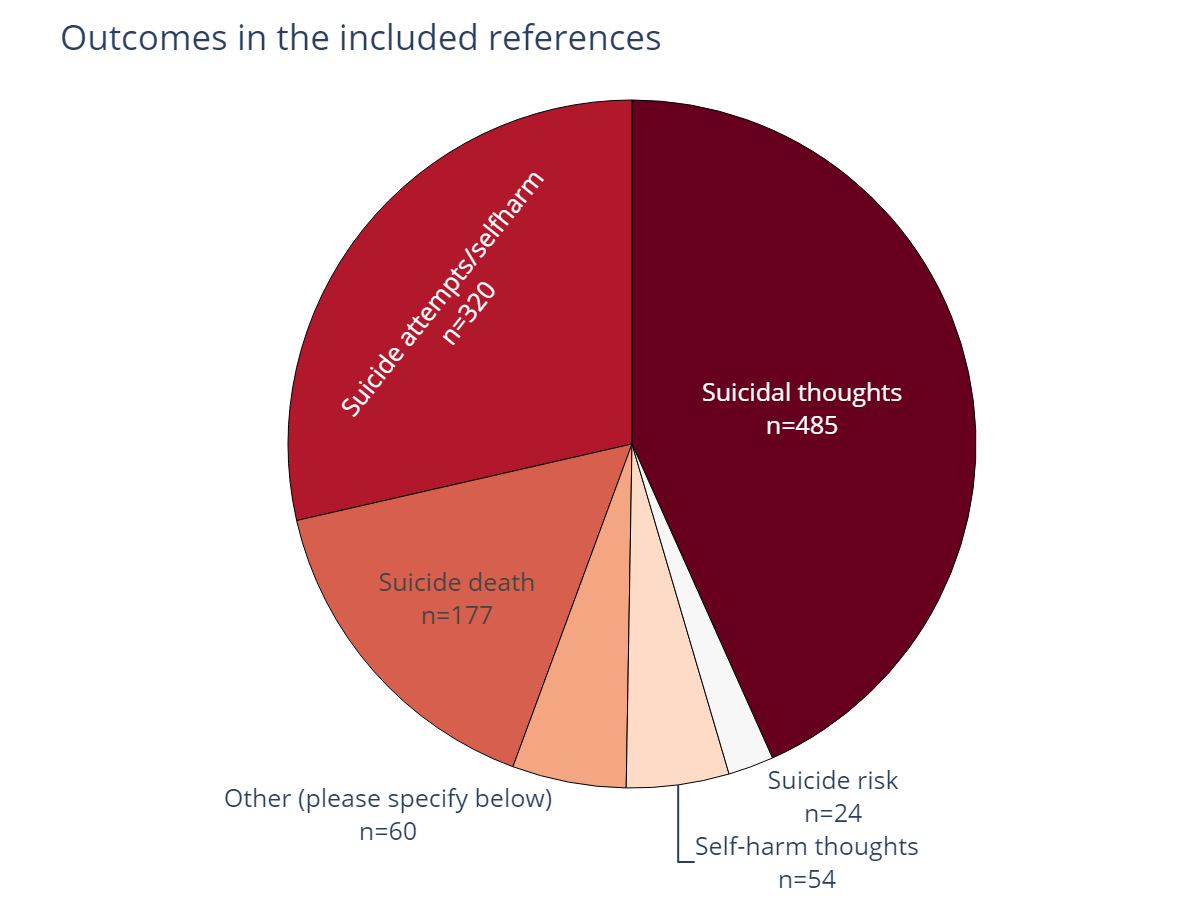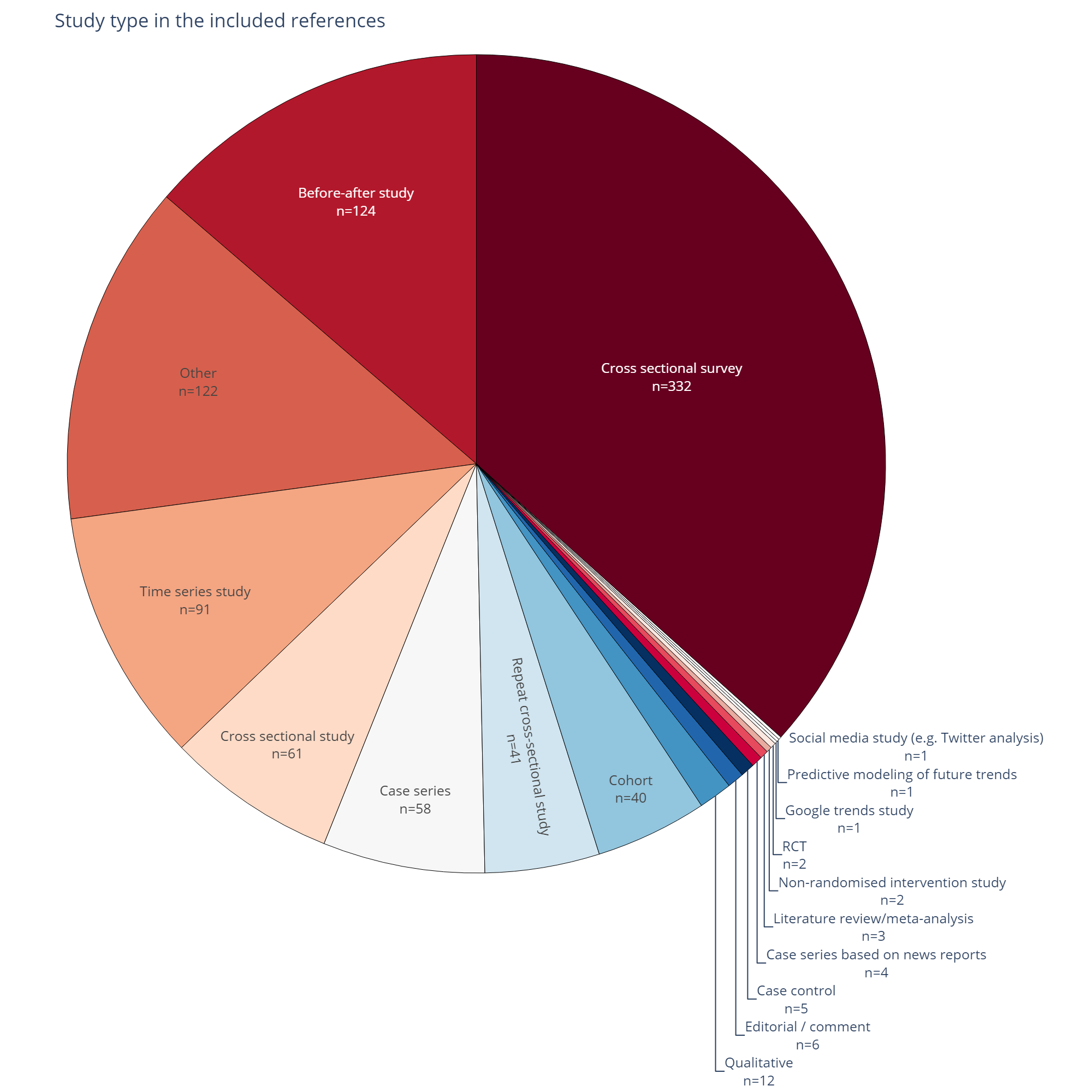Results
Last updated: 2022-08-25
Checks: 7 0
Knit directory: real_suic_website/
This reproducible R Markdown analysis was created with workflowr (version 1.6.2). The Checks tab describes the reproducibility checks that were applied when the results were created. The Past versions tab lists the development history.
Great! Since the R Markdown file has been committed to the Git repository, you know the exact version of the code that produced these results.
Great job! The global environment was empty. Objects defined in the global environment can affect the analysis in your R Markdown file in unknown ways. For reproduciblity it’s best to always run the code in an empty environment.
The command set.seed(20200602) was run prior to running the code in the R Markdown file. Setting a seed ensures that any results that rely on randomness, e.g. subsampling or permutations, are reproducible.
Great job! Recording the operating system, R version, and package versions is critical for reproducibility.
Nice! There were no cached chunks for this analysis, so you can be confident that you successfully produced the results during this run.
Great job! Using relative paths to the files within your workflowr project makes it easier to run your code on other machines.
Great! You are using Git for version control. Tracking code development and connecting the code version to the results is critical for reproducibility.
The results in this page were generated with repository version 9586e81. See the Past versions tab to see a history of the changes made to the R Markdown and HTML files.
Note that you need to be careful to ensure that all relevant files for the analysis have been committed to Git prior to generating the results (you can use wflow_publish or wflow_git_commit). workflowr only checks the R Markdown file, but you know if there are other scripts or data files that it depends on. Below is the status of the Git repository when the results were generated:
working directory clean
Note that any generated files, e.g. HTML, png, CSS, etc., are not included in this status report because it is ok for generated content to have uncommitted changes.
These are the previous versions of the repository in which changes were made to the R Markdown (analysis/results.Rmd) and HTML (results.html) files. If you’ve configured a remote Git repository (see ?wflow_git_remote), click on the hyperlinks in the table below to view the files as they were in that past version.
| File | Version | Author | Date | Message |
|---|---|---|---|---|
| Rmd | 9586e81 | L-ENA | 2022-08-25 | Updated evidence summer 2022 |
| html | 526de12 | Lena Schmidt | 2021-06-18 | Build site. |
| Rmd | 2d46708 | Lena Schmidt | 2021-06-18 | Updated review publication |
| html | bb3cb99 | L-ENA | 2020-06-12 | Build site. |
| html | 1901f95 | L-ENA | 2020-06-04 | Build site. |
| html | d401453 | L-ENA | 2020-06-04 | Build site. |
| html | ad4456d | L-ENA | 2020-06-04 | Build site. |
| html | 68ae5d4 | L-ENA | 2020-06-04 | Build site. |
| html | 36a5b46 | L-ENA | 2020-06-04 | Build site. |
| html | 4a41b88 | L-ENA | 2020-06-03 | Build site. |
| html | f810976 | L-ENA | 2020-06-03 | Build site. |
| html | a7e0ad3 | L-ENA | 2020-06-03 | Build site. |
| html | a63b1eb | L-ENA | 2020-06-03 | Build site. |
| html | 5545c44 | L-ENA | 2020-06-03 | Build site. |
| html | 9482d31 | L-ENA | 2020-06-03 | Build site. |
| html | 209c106 | L-ENA | 2020-06-03 | Build site. |
| html | 02e01b4 | Luke McGuinness | 2020-06-02 | Customising to our review |
| html | 7ab0d3c | Luke McGuinness | 2020-06-02 | Fix conflict |
| html | fb2ab91 | Luke McGuinness | 2020-06-02 | Still customising |
| Rmd | fa2a72f | Luke McGuinness | 2020-06-02 | Customising to our review |
| html | fa2a72f | Luke McGuinness | 2020-06-02 | Customising to our review |
Abstract for the updated living review
The latest living review update was published on June 18, 2021 via F1000 research: The impact of the COVID-19 pandemic on self-harm and suicidal behaviour: update of living systematic review (version 2; peer review: 1 approved, 2 approved with reservations). Please cite as:
Ann John, Emily Eyles, Roger T. Webb, Chukwudi Okolie, Lena Schmidt, Ella Arensman, Keith Hawton, Rory C. O’Connor, Nav Kapur, Paul Moran, Siobhan O’Neill, Luke A. McGuinness, Babatunde K. Olorisade, Dana Dekel, Catherine Macleod-Hall, Hung-Yuan Cheng, Julian P.T. Higgins, David Gunnell. The impact of the COVID-19 pandemic on self-harm and suicidal behaviour: update of living systematic review [version 2; peer review: 1 approved, 2 approved with reservations]. F1000Research 2021, 9:1097 (https://doi.org/10.12688/f1000research.25522.2)
Background: The COVID-19 pandemic has caused considerable morbidity, mortality and disruption to people’s lives around the world. There are concerns that rates of suicide and suicidal behaviour may rise during and in its aftermath. Our living systematic review synthesises findings from emerging literature on incidence and prevalence of suicidal behaviour as well as suicide prevention efforts in relation to COVID-19, with this iteration synthesising relevant evidence up to 19th October 2020.
Method: Automated daily searches feed into a web-based database with screening and data extraction functionalities. Eligibility criteria include incidence/prevalence of suicidal behaviour, exposure-outcome relationships and effects of interventions in relation to the COVID-19 pandemic. Outcomes of interest are suicide, self-harm or attempted suicide and suicidal thoughts. No restrictions are placed on language or study type, except for single-person case reports. We exclude one-off cross-sectional studies without either pre-pandemic measures or comparisons of COVID-19 positive vs. unaffected individuals.
Results: Searches identified 6,226 articles. Seventy-eight articles met our inclusion criteria. We identified a further 64 relevant cross-sectional studies that did not meet our revised inclusion criteria. Thirty-four articles were not peer-reviewed (e.g. research letters, pre-prints). All articles were based on observational studies. There was no consistent evidence of a rise in suicide but many studies noted adverse economic effects were evolving. There was evidence of a rise in community distress, fall in hospital presentation for suicidal behaviour and early evidence of an increased frequency of suicidal thoughts in those who had become infected with COVID-19.
Conclusions: Research evidence of the impact of COVID-19 on suicidal behaviour is accumulating rapidly. This living review provides a regular synthesis of the most up-to-date research evidence to guide public health and clinical policy to mitigate the impact of COVID-19 on suicide risk as the longer term impacts of the pandemic on suicide risk are researched.
Living review updates
We continue our daily reference retrieval and monitoring of relevant publications. The figures below are visualisations of the current, living state of our database. These results are updated regularly and include unpublished and non-peer-reviewed information. For an overview of current publications, please see the tab ‘Publications’ on this website.
This figure shows the papers we included after fulltext screening. The figure is broken down by data source, showing contributions from databases, pre-print servers, and COVID-specific sources across our review’s life-span.
This figure shows our overall screening progress on title and abstracts.
The following figures are indications of the current state of research, as surveyed by our living evidence updates. This interactive map shows countries of origin of the papers included in our project database.
This plot shows outcomes discussed in our included papers.This living review evolved in parallel to the pandemic, thus leading to changes in inclusion criteria that affect study types and outcomes during the past years. Please refer to the website section ‘Publications’ for more information.

This plot shows study types of the papers included in our project database.

sessionInfo()R version 4.0.3 (2020-10-10)
Platform: x86_64-w64-mingw32/x64 (64-bit)
Running under: Windows 10 x64 (build 19043)
Matrix products: default
locale:
[1] LC_COLLATE=English_United States.1252
[2] LC_CTYPE=English_United States.1252
[3] LC_MONETARY=English_United States.1252
[4] LC_NUMERIC=C
[5] LC_TIME=English_United States.1252
attached base packages:
[1] stats graphics grDevices utils datasets methods base
other attached packages:
[1] workflowr_1.6.2
loaded via a namespace (and not attached):
[1] Rcpp_1.0.7 whisker_0.4 knitr_1.30 magrittr_2.0.1
[5] R6_2.5.0 rlang_0.4.12 fastmap_1.1.0 fansi_0.4.1
[9] stringr_1.4.0 tools_4.0.3 xfun_0.27 utf8_1.1.4
[13] git2r_0.27.1 jquerylib_0.1.4 htmltools_0.5.2 ellipsis_0.3.2
[17] rprojroot_2.0.2 yaml_2.2.1 digest_0.6.27 tibble_3.1.5
[21] lifecycle_1.0.1 crayon_1.4.2 later_1.1.0.1 sass_0.4.0
[25] vctrs_0.3.8 promises_1.1.1 fs_1.5.0 glue_1.4.2
[29] evaluate_0.14 rmarkdown_2.11 stringi_1.5.3 bslib_0.3.1
[33] compiler_4.0.3 pillar_1.6.4 jsonlite_1.7.2 httpuv_1.5.4
[37] pkgconfig_2.0.3